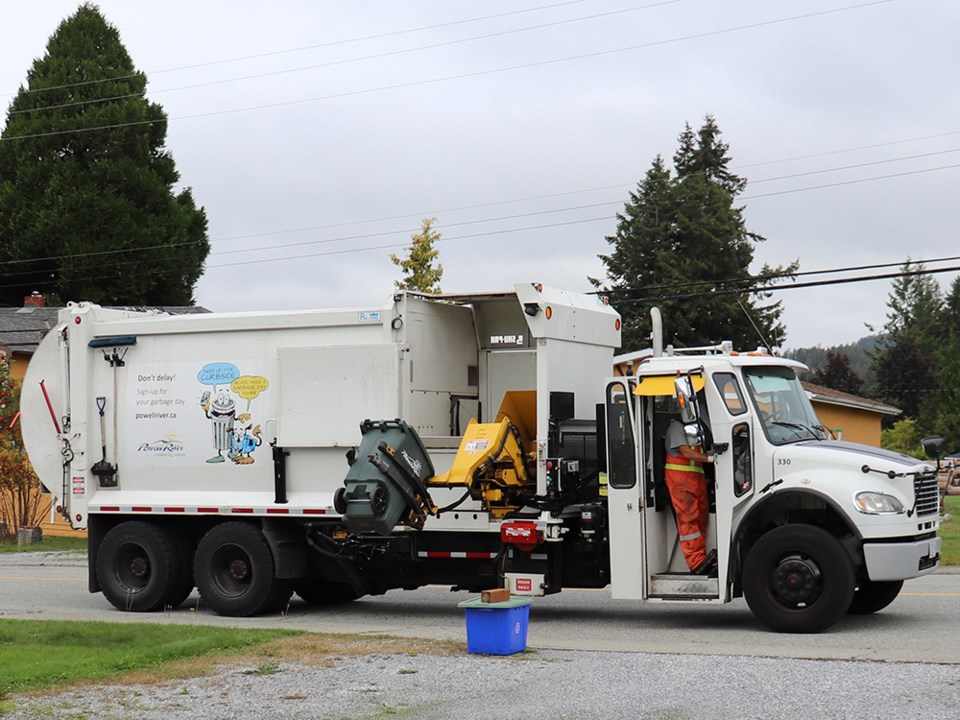City of Powell River’s staff had been directed to price out a fully electric model for its next garbage truck, but cost and lack of availability resulted in a diesel model being selected.
At the April 7 city council meeting, councillors heard from manager of operational services Rod Fraser, who, at a March 24 meeting, had made a presentation asking for $60,000 for the purchase of the third truck, because the $400,000 budgeted was not sufficient. Fraser was directed at that meeting to get quotes on what an electric garbage truck would cost, and to determine availability.
Reporting on his findings, Fraser said he put together a cost comparison between fully electric and internal combustion garbage trucks. City staff connected with the vendor chosen for the new internal combustion engine vehicle, he added.
“They weren’t able to give us quotations or actual full costs on those units,” said Fraser. “They are taking delivery of a fully electric garbage truck in mid-June of this year and they welcomed us to look at it.
“[Electric trucks] are not readily available for us. In the tender process, we did not get any fully electric trucks that were bid to us. There are fewer than a handful of municipalities in the province that are running them. They are very new and very much in the pilot and experimental stage.”
Fraser said delivery of a fully electric truck, if one could be ordered, is about two years out, so procurement would be about one year behind a conventional truck. Cost of a conventional truck is $455,000 and the equivalent fully electric vehicle is estimated at $850,000, added Fraser. He said there is a $100,000 grant for the electric vehicle, however. Maintenance costs of the electric vehicle are less because items such as oil changes are not required, he added.
“The total life cycle cost for the Mack electric truck is $1.1 million and change, and the total lifecycle cost for the conventional diesel truck, with a fuel cost of $263,000, is around $970,000,” said Fraser. “Our best recommendation for council is to proceed with the purchase of the conventional truck for $455,000. If you choose to do that, we would ask for a $55,000 budget increase to purchase that conventional truck. Not only will it help with the collection of garbage and recycling, but it’s really the key point for collection of organics in 2023, when organics are anticipated to come online.”
Fraser said the two current garbage trucks will be at the end of useful service life in 2024 and will be scheduled for replacement.
“One of the recommendations we would have for council is to go ahead and bring back some funding options for fully electric trucks for those two,” said Fraser.
Councillor CaroleAnn Leishman asked when the third truck would be needed, given that the organics facility is at least a year and a half away from being operational. She asked if it would be a problem to postpone the purchase of the third truck approval until costing could be achieved on an electric truck, and if that would be a problem operationally.
Fraser said that would be council’s decision, but the recommendation is to go ahead with the conventional vehicle so it can be in place to get the collection of organics up and running. He said it would also help with the collection of recycling and garbage.
“Really, it helps operations now, and it’s the key point for organics,” added Fraser.
Mayor Dave Formosa said it is a great idea to go electric at some point, but he wouldn’t mind seeing electric trucks in action with municipalities for a while to make sure they will be adequate if the city is spending $850,000 per truck, or $750,000 with a rebate.
“I would like to know if they are going to be good, but I also understand they would be a really nice addition to our climate action targets,” added Formosa.
Councillor George Doubt made a motion to authorize an increase of up to $55,000 to the third garbage truck, with funding from the equipment reserve. Council voted to authorize the $55,000, with Leishman opposed.
Council voted unanimously to direct staff to include options in the next financial plan budget process such that the equipment reserve is adequately funded to purchase electric or other green vehicle technology, solid waste collection trucks when the existing trucks are at the end of their useful life cycles.



